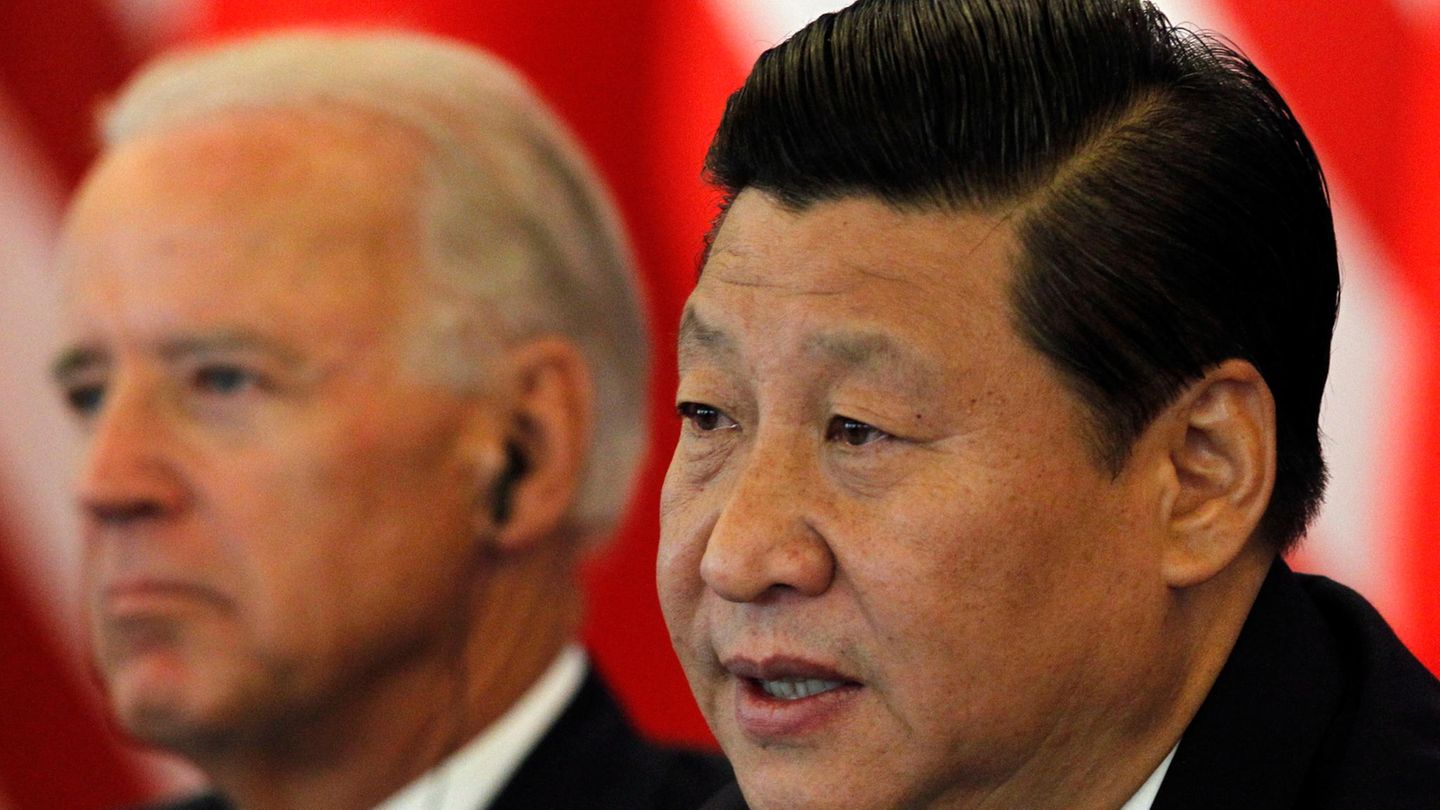Interview
The tone is getting rougher between the USA and China, and most recently US President Joe Biden even used the word “war”. The external expert Stormy Annika Mildner explains in stern-Interview where the test of strength can lead.
Ms. Mildner, US President Joe Biden has warned of the outbreak of real war in connection with the cyberattacks on the West. How is this to be understood: as a threat or as a fear?
According to surveys, China is the number one enemy for nearly half of the US population. Non-partisan, the country is perceived not only as an economic challenge, but also as a system rival. The White House communicates this very clearly. Because, of course, the government fears cyber attacks on the country’s critical infrastructure, plus the Taiwan issue.
In what way?
The US government has the impression that China may be planning an invasion of Taiwan. The country is already carrying out countless cyber attacks against Taiwan and does not save with threatening gestures. Rhetorically or militarily, for example with regular overflights of fighter jets. Biden has to show strength, because the protection of Taiwan is anchored in the US by the “Six Pledge Agreement”. I understand his words to mean that he wants to counter the government in Beijing.
Is the US ready for the worst?
I’m not sure whether there could be a real, hot war. The consequences of an invasion of Taiwan would be incalculable – for all sides. Beijing knows that and Washington knows that – despite all the threats and rhetorical exaggerations.
Why has the relationship between the US and China deteriorated so badly?
The West used to hope that China would open up and become more liberal through trade and involvement in international organizations. Appropriate approaches were also discernible for a while. But for four or five years we have found that this was a mistake. On the contrary, the trend is actually going in exactly the other direction.

© Aspen Institute Germany
Dr. Stormy-Annika Mildner
… is director of the Aspen Institute Germany, an offshoot of the US think tank of the same name. Before that, she headed the BDI’s foreign trade policy.
So is ex-US President Donald Trump right when he concluded, “We don’t need China” shortly before he left office?
No, we really need China. To solve global challenges such as climate change, to contain pandemics and for economic stability. The USA needs China, Europe needs China and that was recently emphasized again at the EU-USA, G7 and NATO summits. Also from Joe Biden. But of course the Americans – and we too – draw very clear red lines following their values, which China cannot accept.
President Trump had taken a confrontational course against China, especially in trade. Was that right?
His government has pursued a policy of decoupling. Think, for example, of the “Entity List” which restricts US companies’ trade with China, punitive tariffs or stricter investment and export controls. He has tried to sanction violations of international business law, such as patent protection or forced technology transfer. Trump wanted to make the US more independent from China and its exports. But his policy of hustle and bustle and the spiral of tariffs have seriously damaged the international system.
But some of it was also in the interests of the Europeans …
I would rather say that we Europeans assessed many things in a similar way, such as the human rights situation or unfair trade practices. But we did not support the instruments that Trump used. For example, this back and forth on tariffs or the weakening of the World Trade Organization.
What is Joe Biden doing differently?
The new US administration is returning to finding a common course with its traditional allies. The fact that the EU and the USA are working together again is also due to the fact that China is perceived more than before as a competitor and challenger. Incidentally, also in those parts of Europe that have so far been very open to Chinese money and investments. They also see that China promises a lot, but delivers relatively little.
Do you have an example?
In Montenegro, for example, China financed a motorway, which has made the country, which is already heavily indebted, a dangerous dependency on Beijing. Such projects or the “New Silk Road” will become less attractive for these states. That leads the EU back to the USA. Not least because hardly anyone in the EU believes that China is liberalizing or democratizing itself.
In China, President Xi Jinping seems to be clearly pulling the reins: He has “brought Hong Kong on line”, and authorities are cracking down on influential business people who criticize Xi. He himself recently, and as the first head of state in decades, visited the troubled region of Tibet again, and censorship has recently been tightened again. Is the government now shedding its last shyness?
In any case, I have the impression that the situation in China has been worsening for three or four years. The government sees that the system is less stable than it would like and is opposing it. Efforts for more freedom and independence are stifled. And the officials are sure to increasingly focus the country on Head of State Xi Jinping.
Do you see any signs that relations with China could improve?
Not at this point. It is positive that the US government under Joe Biden is communicating clearly and reliably again and making its expectations clear. This also means that Beijing should make a constructive contribution to international organizations such as the WTO and the WHO. US Vice Secretary of State Wendy Sherman made this clear during her visit to China: The US does not want to push the Chinese off the globe, but rather to work with them.
What speaks against your view?
Unfortunately, there are no indicators that suggest that China is changing course. Neither in terms of Hong Kong or human rights and dealing with the Uyghurs. Not even when it comes to behavior in cyberspace or freedom of the press. In the health sector, China is not helping to determine the origin of the coronavirus. As long as nothing changes on these points, the Americans will continue their course of confrontation.
Are you pessimistic?
Despite the human rights violations, despite what is happening in Hong Kong, despite the threats against Taiwan, the new US administration will not let the threads of the conversation break. Biden also wants more independence from China in some areas, but – unlike Trump – he does not want to pursue a complete decoupling policy. And that’s why both sides continue to exchange ideas. After all.
David William is a talented author who has made a name for himself in the world of writing. He is a professional author who writes on a wide range of topics, from general interest to opinion news. David is currently working as a writer at 24 hours worlds where he brings his unique perspective and in-depth research to his articles, making them both informative and engaging.




